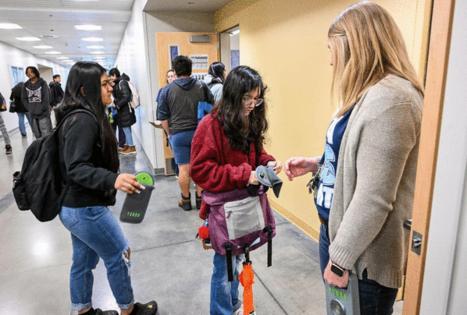Mass. Democrats argue public school cellphone ban will improve students' mental health
Published in News & Features
The highest ranking Democrat in the Massachusetts Senate said a proposal the chamber plans to debate Thursday that would largely ban the use of cellphones in public school classrooms addresses the “greatest distraction device ever created.”
Supporters of a bill that would implement a “bell-to-bell” prohibition on personal electronic devices argue students perform better when they are not distracted by cellphones and that their mental health receives a boost when screen time is limited.
Senate President Karen Spilka said there is “mounting evidence” that cellphone usage among students during the school day is “strongly detrimental for a number of reasons.”
“I can’t imagine what 24/7 content, both impersonal and very personal, must do for a child trying to navigate learning while juggling emotions and the normal pressures of growing up,” the Ashland Democrat said at the State House.
The legislation the Senate is expected to approve requires all public schools and districts to implement policies for student use of personal electronic devices on school grounds and during school-sponsored activities before the start of the 2026-2027 academic year.
Those policies must include a “bell-to-bell” prohibition on student access to personal electronic devices during the school day and a method for parents or guardians and students to contact each other during the school day if necessary.
The bill defines a personal electronic device as any portable electronic “capable of providing voice communication, text messaging, or other data communication between two or more parties or devices, or capable of connecting to a smartphone or other personal electronic device, the internet, or a cellular or Wi-Fi network, or provides application usage.”
“Personal electronic devices include, but are not limited to, mobile phones, tablets, smartwatches, and Bluetooth-enabled devices. A personal electronic device shall not preclude the use of school-issued or sanctioned devices that serve a legitimate educational purpose,” the bill said.
Policies banning cellphones can include exceptions for school and student health and safety, “necessary accommodations.” The legislation also requires cellphone policies to include methods for parents and guardians and students to be able to contact one another during the school day if necessary.
As of Monday, 33 states had enacted laws or policies on K-12 classroom or school cellphone usage, according to Ballotpedia. Another 26 states, including New Hampshire and Vermont, ban or limit cellphones in classrooms.
Framingham Teachers Association President Christine Mulroney said even the most motivated students “can get completely derailed by a single buzz, a text, or a notification.”
“Even when students want to focus, the urge to check their phones is powerful and often automatic,” said Mulroney, who serves as a public school teacher in a city that falls inside Spilka’s Senate district.
Spilka said there was not a single “bill on this topic filed” during the 2023-2024 legislative session. But at least six were submitted when the 2025-2026 term kicked off earlier this year.
“This issue clearly has exploded as a problem in schools,” Spilka said.
The issue has gained momentum in Massachusetts, where top Democrats like Gov. Maura Healey and Attorney General Andrea Campbell have publicly supported reining in cellphone usage in classrooms.
Lawmakers filed 19 amendments to the legislation ahead of Thursday’s debate, including proposals that touch on exemptions to cellphone bans, social media in schools, and media literacy.
The Senate is scheduled to gavel into session at 11 a.m.
_____
©2025 MediaNews Group, Inc. Visit at bostonherald.com. Distributed by Tribune Content Agency, LLC.







Comments